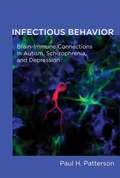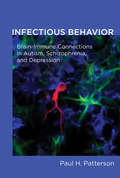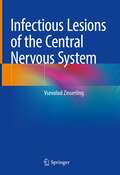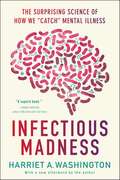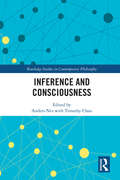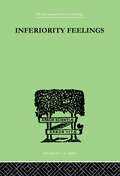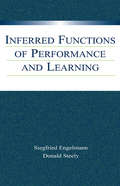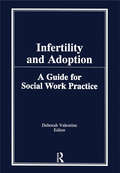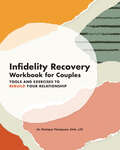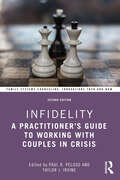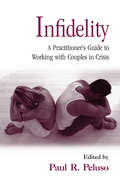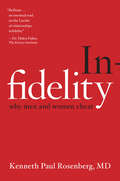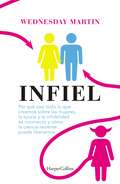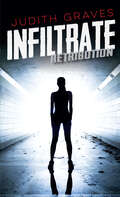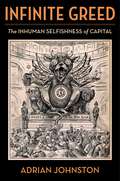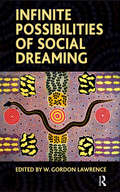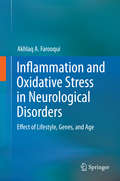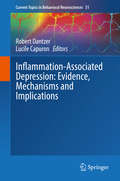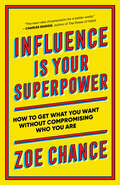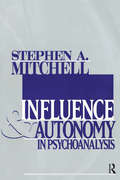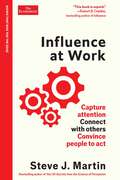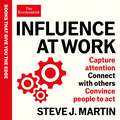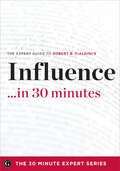- Table View
- List View
Infectious Behavior
by Paul H. PattersonIn Infectious Behavior, neurobiologist Paul Patterson examines the involvement of the immune system in autism, schizophrenia, and major depressive disorder. Although genetic approaches to these diseases have garnered the lion's share of publicity and funding, scientists are uncovering evidence of the important avenues of communication between the brain and the immune system and their involvement in mental illness. Patterson focuses on this brain-immune crosstalk, exploring the possibility that it may help us understand the causes of these common but still mysterious diseases. The heart of this engaging book, accessible to nonscientists, concerns the involvement of the immune systems of the pregnant woman and her fetus, and a consideration of maternal infection as a risk factor for schizophrenia and autism. Patterson reports on research that may shed light on today's autism epidemic. He also outlines the risks and benefits of both maternal and postnatal vaccinations. In the course of his discussion, Patterson offers a short history of immune manipulation in treating mental illness (recounting some frightening but fascinating early experiments) and explains how the immune system influences behavior and how the brain regulates the immune system, looking in particular at stress and depression. He examines the prenatal origins of adult disease and evidence for immune involvement in autism, schizophrenia, and depression. Finally, he describes the promise shown by recent animal experiments that have led to early clinical trials of postnatal and adult treatments for patients with autism and related disorders. For questions for the author, and updates on the various topics covered in the book since its publication, please check the book's website: http://mitpress. mit. edu/infectiousbehavior
Infectious Behavior: Brain-Immune Connections in Autism, Schizophrenia, and Depression
by Paul H. PattersonAn examination of brain-immune system communication in autism, schizophrenia, and depression.In Infectious Behavior, neurobiologist Paul Patterson examines the involvement of the immune system in autism, schizophrenia, and major depressive disorder. Although genetic approaches to these diseases have garnered the lion's share of publicity and funding, scientists are uncovering evidence of the important avenues of communication between the brain and the immune system and their involvement in mental illness. Patterson focuses on this brain-immune crosstalk, exploring the possibility that it may help us understand the causes of these common, but still mysterious, diseases. The heart of this engaging book, accessible to nonscientists, concerns the involvement of the immune systems of the pregnant woman and her fetus, and a consideration of maternal infection as a risk factor for schizophrenia and autism. Patterson reports on research that may shed light on today's autism epidemic. He also outlines the risks and benefits of both maternal and postnatal vaccinations.In the course of his discussion, Patterson offers a short history of immune manipulation in treating mental illness (recounting some frightening but fascinating early experiments) and explains how the immune system influences behavior and how the brain regulates the immune system, looking in particular at stress and depression. He examines the prenatal origins of adult disease and evidence for immune involvement in autism, schizophrenia, and depression. Finally, he describes the promise shown by recent animal experiments that have led to early clinical trials of postnatal and adult treatments for patients with autism and related disorders.
Infectious Lesions of the Central Nervous System
by Vsevolod ZinserlingThis book discusses all aspects infectious CNS pathology, including different bacterial, viral, fungal, mycoplasma and protozoan pathogens, accompanied by illustrations that show macro- and histopathological changes. It also presents microbiological, epidemiological and clinical data, with a particular focus on meningitis and encephalitis of different bacterial and viral aetiologies, influenza, COVID-19 and other viral and bacterial generalized infections. Further, the book explores the importance of mixed infections, including those in the late stages of HIV infection, as well as pathological changes in different age groups including newborns. A special chapter is devoted to the probable role of biological pathogens in noninfectious brain pathology.
Infectious Madness: The Surprising Science of How We "Catch" Mental Illness
by Harriet A. WashingtonA groundbreaking look at the connection between germs and mental illness, and how we can protect ourselves. Is it possible to catch autism or OCD the same way we catch the flu? Can a child's contact with cat litter lead to schizophrenia? In her eye-opening new book, National Book Critics Circle Award-winning author Harriet Washington reveals that we can in fact "catch" mental illness. In INFECTIOUS MADNESS, Washington presents the new germ theory, which posits not only that many instances of Alzheimer's, OCD, and schizophrenia are caused by viruses, prions, and bacteria, but also that with antibiotics, vaccinations, and other strategies, these cases can be easily prevented or treated. Packed with cutting-edge research and tantalizing mysteries, INFECTIOUS MADNESS is rich in science, characters, and practical advice on how to protect yourself and your children from exposure to infectious threats that could sabotage your mental and physical health.
Inference and Consciousness (Routledge Studies in Contemporary Philosophy)
by Timothy Chan Anders NesInference has long been a central concern in epistemology, as an essential means by which we extend our knowledge and test our beliefs. Inference is also a key notion in influential psychological accounts of mental capacities, ranging from problem-solving to perception. Consciousness, on the other hand, has arguably been the defining interest of philosophy of mind over recent decades. Comparatively little attention, however, has been devoted to the significance of consciousness for the proper understanding of the nature and role of inference. It is commonly suggested that inference may be either conscious or unconscious. Yet how unified are these various supposed instances of inference? Does either enjoy explanatory priority in relation to the other? In what way, or ways, can an inference be conscious, or fail to be conscious, and how does this matter? This book brings together original essays from established scholars and emerging theorists that showcase how several current debates in epistemology, philosophy of psychology and philosophy of mind can benefit from more reflections on these and related questions about the significance of consciousness for inference.
Inferences during Reading
by Anne E. And Lorch, Robert F. O'Brien Edward J. And Cook, Anne E. And Cook Jr. Edward J. O'Brien Anne E. Cook Robert F. Lorch Jr.Inferencing is defined as 'the act of deriving logical conclusions from premises known or assumed to be true', and it is one of the most important processes necessary for successful comprehension during reading. This volume features contributions by distinguished researchers in cognitive psychology, educational psychology, and neuroscience on topics central to our understanding of the inferential process during reading. The chapters cover aspects of inferencing that range from the fundamental bottom-up processes that form the basis for an inference to occur, to the more strategic processes that transpire when a reader is engaged in literary understanding of a text. Basic activation mechanisms, word-level inferencing, methodological considerations, inference validation, causal inferencing, emotion, development of inferences processes as a skill, embodiment, contributions from neuroscience, and applications to naturalistic text are all covered as well as expository text, online learning materials, and literary immersion.
Inferiority Feelings: In the Individual and the Group (International Library Of Psychology Ser.)
by Oliver BrachfeldIncluding volumes originally published between 1910 and 1957, the Abnormal and Clinical Psychology set of the International Library of Psychology clearly shows the evolution of approaches to, and definitions of, conditions such as nervous anxiety, neuroses, hysteria, delinquency, insanity and mental illness, It provides a compelling insight into how attitudes to such states have changed during this century. Other subjects covered include psychotherapy with children, personality, abnormal psychology, the relationship between brain and personality and psychotic art.
Inferred Functions of Performance and Learning
by Siegfried Engelmann Donald SteelyThis ambitious, highly theoretical book provides a capstone for the careers of two very distinguished scholars. It begins with an analysis of what functions and systems must exist for any organism or machine to perform an unlearned act, that is, with an analysis of what must be "wired into" the organism or machine. Once the basics of unlearned responding have been established, the authors then systematically show how learning mechanisms can be layered onto that foundation in ways that account for the performance of new, learned operations that eventually culminate in the acquisition of higher-order operations that involve concepts and language. This work is of interest to various practitioners engaged in analyzing and creating behavior: the ethnologist, the instructional designer, the learning psychologist, the physiologist-neurobiologist, and particularly the designer of intelligent machines.
Infertility Counseling
by Sharon N. Covington Linda Hammer BurnsInfertility Counseling: A Comprehensive Handbook for Clinicians, second edition, is a comprehensive, multidisciplinary textbook for all health professionals providing care for individuals facing reproductive health issues. It is the most thorough and extensive book currently available for clinicians in the field of infertility counseling, providing an exhaustive and comprehensive review of topics. It addresses both the medical and psychological aspects of infertility, reviewing assessment approaches, treatment strategies, counseling for medical conditions impacting fertility, third-party reproduction, alternative family building and post infertility counseling issues. Each chapter follows the same format: introduction, historical overview, literature review, theoretical framework, identification of clinical issues, suggestions for therapeutic interventions, and future implication. This edition also includes extensive appendixes of clinical tools useful to the clinician, including an Internet database of resources and an extensive glossary of terminology.
Infertility and Adoption: A Guide for Social Work Practice
by Deborah P ValentineThis compassionate book brings together for the first time issues about infertility and adoption. Fifteen to 20 of all married couples in the United States are infertile, and most people have intense psychological and emotional reactions to the experience of infertility. Infertility and Adoption provides a clear understanding of the historical and social context of infertility, its emotional impact, and the process of coping with infertility. A prototype for conducting psychosocial assessments with infertile couples is provided. Practitioners, researchers, and administrators will learn about the latest trends in preparing adoptive parents for the arrival of their child. The multidisciplinary appeal of this book will reach professionals in social work and mental health and better prepare all of those who work with the growing number of individuals touched by infertility.
Infidelity Recovery Workbook for Couples: Tools and Exercises to Rebuild Your Relationship
by Dr. Monique Thompson DHA, LPCRepairing your relationship after infidelity—an unbiased, hands-on workbook for couples Couples can and do survive infidelity, but they must first commit to the honesty and emotional work that's required for lasting change. The Infidelity Recovery Workbook for Couples helps you do that, with a collection of evidence-based advice and activities to help facilitate the healing process. You'll explore the different types of infidelity, learn effective communication language, and begin the process of rebuilding your trust, happiness, and future together. Commit to a better future with your partner with: An expert first step—Work through your relationship issues with quizzes, writing prompts, and guided questions that help you express your feelings, grow more intimate, and practice forgiveness. Strategies for both partners—Learn effective techniques for speaking and listening that honor the perspectives and feelings of both partners equally. For all couples—Couples of any age, gender, marital status, religion, or sexual orientation will find guidance from a licensed mental health professional who specializes in infidelity. Recover from relationship infidelity with this book of clear and empathetic strategies that every couple can use.
Infidelity: A Practitioner’s Guide to Working with Couples in Crisis (Family Systems Counseling: Innovations Then and Now)
by Paul R. Peluso Taylor J. IrvineThis second edition brings together an impressive array of experts to discuss and provide understanding to the treatment of infidelity.Bringing together voices from a range of disciplines and backgrounds, including couples therapy, family therapy, evolutionary psychology, relational research, and more, Peluso and Irvine help therapists understand and practically treat this common and complex issue. Divided into three parts, chapters begin by laying the foundations for understanding why couples commit infidelity before looking at different treatments, such as Gottman Method Couples Therapy, models of fidelity and forgiveness, and other integrative approaches. This new edition includes brand-new material on topics such as nonmonogamy, teletherapy, cyber-infidelity, and the impact of infidelity on couples and families from different social, cultural, generational, and sexual perspectives.With revised referrals and resources at the end of each chapter; additional infidelity treatment methods; and examinations of gender, race, and power, this guide is essential reading for all practicing and training marriage and family therapists, counselors, psychotherapists, and social workers.
Infidelity: A Practitioner’s Guide to Working with Couples in Crisis (Routledge Series on Family Therapy and Counseling)
by Paul R. PelusoWhen one partner in a relationship is unfaithful to the other, it takes a lot of work by both parties involved to salvage the relationship. In today’s therapy-friendly climate, marriage/couples counseling is often a part of that rebuilding process. Many couples seek out professional therapy after an affair is out in the open, but often the act of infidelity is revealed while uncovering and discussing unrelated issues for which the couple is in counseling. And yet, amazingly, as common as this complex and difficult topic arises in therapy, there is relatively little professional literature devoted to understanding and "treating" infidelity. In this volume, Paul Peluso has assembled a truly impressive list of contributors from a range of disciplines and backgrounds, including marital therapy, family therapy, evolutionary psychology, marriage research, and cyberstudies, with the aim of filling this void.
Infidelity: Why Men and Women Cheat
by Kenneth Paul RosenbergWhat the latest science tells us about the brain's reward systems, love, and sex--and how to prevent an affair from destroying your lifeHow can I prevent an affair from destroying my life? Whether I am the cheater or the betrayed partner, how can I survive, even thrive, in the wake of an affair? Infidelity provides key insights to find your true sexual and romantic potential and advocates honesty, trust, and integrity--the fundamentals of love. People often cheat in a haze of delusion, believing that it will bring them real love, help them have better sex, lift their spirits, and boost their sagging self-esteem; however, very often, cheating wrecks relationships and erodes self-esteem. In Infidelity, one of America's top doctors combines neuroscience, addiction theory, and common sense to explain the three types of cheating: emotional, virtual, and physical; why they're so prevalent; and how to live in accordance with our values when we are drawn to stray. Examining what the latest science tells us about the brain's reward systems, love, and sex, Dr. Kenneth Paul Rosenberg reveals what drives men and women to cheat and what they can do about it. At a time when America's pornography obsession rises to the level of a competing sexual interest, when is porn a problem, and when does it count as infidelity? And since it is not the act of infidelity alone that destroys a couple, how does any couple prevent growing apart? Through concrete rules addressing these and other vital questions, Dr. Rosenberg guides couples on how to prevent cheating, stop it from progressing, and repair the damage caused by an affair.
Infiel
by Wednesday MartinWednesday Martin nos proyecta desde una perspectiva personal y científica algunos temas que han estado castigados por la sociedad durante siglos: la infidelidad, la monogamia, la lujuria, las mujeres y el sexo.Una visualización moderna que muestra la diferencia entre la sexualidad masculina y la femenina que teme a las consecuencias construidas por la sociedad a través de entrevistas realizadas a expertos y mujeres reales que han experimentado de cerca la monogamia y la infidelidad. Infiel, es una mirada fascinante a la sexualidad femenina que puede alejarnos de nuestra zona de confort y sin duda cambiará nuestra forma de pensar acerca del sexo y las mujeres para siempre.
Infiltrate (Orca Soundings #5)
by Judith GravesIn this sequel to Exposed, Raven is once again fighting for the underdog. When a desperate wave of teen suicides threatens to overwhelm her school, Raven does some digging and learns that all of the victims have one thing in common: issues with anxiety. With help from Team Retribution, Raven links the deaths to an unauthorized drug trial at a shady medical center. To find out more, she goes undercover, but things quickly get out of her control. Soon she's not sure what is real and what is a drug-induced fantasy. The epub edition of this title is fully accessible. The RETRIBUTION series: "These interconnected narratives are page-turning reads, offering adventure, intrigue, and satisfying retribution. Jace, Josie, and Raven are fiercely independent, clever, and intelligent protagonists; each has a rich backstory and an engaging narrative voice that hooks readers from the beginning. Will appeal to a wide range of readers, including reluctant readers who need a quick hook." - VOYA
Infinite Greed: The Inhuman Selfishness of Capital (Insurrections: Critical Studies in Religion, Politics, and Culture)
by Adrian JohnstonSelfishness is essential to capitalism—or so both advocates and opponents claim. In Infinite Greed, Adrian Johnston argues that this consensus is mistaken. Through a novel synthesis of Marxism and psychoanalysis, he reveals how the relentless pursuit of profits is not fundamentally animated by human acquisitiveness. Instead, capitalism’s strange “infinite greed” demands that individuals sacrifice their pleasures, their well-being, and even themselves to serve inhuman capital.Johnston traces the mechanisms that compel capitalist subjects to obey the cold imperative to accumulate in perpetuity and without limits—and also without regard for the consequences for everyone and everything else. Facing crises such as spiraling wealth inequality and the profit-driven prospect of a looming ecological apocalypse, the rational self-interest of the majority would seem to dictate putting a stop to capitalist accumulation. By bringing together the Marxian critique of political economy with psychoanalytic metapsychology, Johnston shows why and how capitalism, rather than being responsive to people’s rationally selfish interests, disregards and overrides them instead.Unlike previous syntheses of Marxism and psychoanalysis, Infinite Greed pairs Freudian and Lacanian concepts with the economic heart of Marx’s historical materialism. In so doing, Johnston brings to light the complex intertwining of political and libidinal economies keeping us invested and complicit in perpetuating capitalism and its ills.
Infinite Possibilities of Social Dreaming
by W. Gordon LawrenceExamining recalled dreams with many others in a Social Dreaming Matrix leads to the transformation of the thinking embedded in the dreams. There are infinite meanings to a dream by regarding the dream as an unconscious product of cultural knowledge, not as an expression of the psyche exclusively, opening new possibilities of thinking.
Inflammation and Oxidative Stress in Neurological Disorders
by Akhlaq A. FarooquiUnless new discoveries are made in the prevention or treatment of stroke, Alzheimer's Disease and depression, the number of patients with these diseases is sure to increase dramatically by the year 2050. Thus, developing strategies to retard or delay the onset of stroke, AD and depression these neurological disorders is of critical important. The present monograph will provide current and comprehensive information on the relationship between neuroinflammation and oxidative stress in age-related neurological disorders at the molecular level. The information described in this monograph on lifestyle (diet and exercise), genes and age is intended to facilitate and promote new discoveries for the treatment of age-related neurological disorders.
Inflammation-Associated Depression: Evidence, Mechanisms and Implications
by Robert Dantzer Lucile CapuronInflammation has invaded the field of psychiatry. The finding that cytokines are elevated in various affective and psychotic disorders brings to the forefront the necessity of identifying the precise research domain criteria (RDoCs) that inflammation is responsible for. This task is certainly the most advanced in major depressive disorders. The reason is that a dearth of clinical and preclinical studies has demonstrated that inflammation can cause symptoms of depression and conversely, cytokine antagonists can attenuate symptoms of depression in medical and psychiatric patients with chronic low grade inflammation. Important knowledge has been gained on the symptom dimensions that inflammation is driving and the mechanisms of action of cytokines in the brain, providing new targets for drug research and development. The aim of the book "Inflammation-Associated Depression" is to present this field of research and its implications in a didactic and comprehensive manner to basic and clinical scientists, psychiatrists, physicians, and students at the graduate level.
Influence Is Your Superpower: The Science of Winning Hearts, Sparking Change, and Making Good Things Happen
by Zoe ChanceRediscover the superpower that makes good things happen, from the professor behind Yale School of Management's most popular class &“The new rules of persuasion for a better world.&”—Charles Duhigg, author of the bestsellers The Power of Habit and Smarter Faster Better You were born influential. But then you were taught to suppress that power, to follow the rules, to wait your turn, to not make waves. Award-winning Yale professor Zoe Chance will show you how to rediscover the superpower that brings great ideas to life.Influence doesn&’t work the way you think because you don&’t think the way you think. Move past common misconceptions—such as the idea that asking for more will make people dislike you—and understand why your go-to negotiation strategies are probably making you less influential. Discover the one thing that influences behavior more than anything else. Learn to cultivate charisma, negotiate comfortably and creatively, and spot manipulators before it&’s too late. Along the way, you&’ll meet alligators, skydivers, a mind reader in a gorilla costume, Jennifer Lawrence, Genghis Khan, and the man who saved the world by saying no. Influence Is Your Superpower will teach you how to transform your life, your organization, and perhaps even the course of history. It&’s an ethical approach to influence that will make life better for everyone, starting with you.
Influence and Autonomy in Psychoanalysis (Relational Perspectives Book Series #Vol. 9)
by Stephen A. MitchellStephen A. Mitchell has been at the forefront of the broad paradigmatic shift in contemporary psychoanalysis from the traditional one-person model to a two-person, interactive, relational perspective. In Influence and Autonomy in Psychoanalysis, Mitchell provides a critical, comparative framework for exploring the broad array of concepts newly developed for understanding interactive processes between analysand and analyst. Drawing on the broad traditions of Kleinian theory and interpersonal psychoanalysis, as well as object relations and progressive Freudian thought, he considers in depth the therapeutic action of psychoanalysis, anachronistic ideals like anonymity and neutrality, the nature of analytic knowledge and authority, and the problems of gender and sexual orientation in the age of postmodernism. The problem of influence guides his discussion of these and other topics. How, Mitchell asks, can analytic clinicians best protect the patient’s autonomy and integrity in the context of our growing appreciation of the enormous personal impact of the analyst on the process? Although Mitchell explores many facets of the complexity of the psychoanalytic process, he presents his ideas in his customarily lucid, jargon-free style, making this book appealing not only to clinicians with various backgrounds and degrees of experience, but also to lay readers interested in the achievements of, and challenges before, contemporary psychoanalysis. A splendid effort to relate parallel lines of theorizing and derivative changes in clinical practice and informed by mature clinical judgment and broad scholarship into the history of psychoanalytic ideas, Influence and Autonomy in Psychoanalysis takes a well-deserved place alongside Mitchell’s previous books. It is a brilliant synthesis of converging insights that have transformed psychoanalysis in our time, and a touchstone for enlightened dialogue as psychoanalysis approaches the millennium.
Influence at Work: Capture attention, connect with others, convince people to act (The Economist Edge Series)
by Steve J. MartinFrom the New York Times bestselling author on the psychology of persuasion: a brilliant new guide to improving your influence at work—and beyond.To be successful at work you also need to be influential at work. And to be influential requires an understanding of how the rules of influence work. Not just those mandated by logic, economics and company policy. But the unspoken rules too. The rules people rarely talk about, but that frequently have an out-sized impact on who and what gets listened to and done, and who and what gets ignored. Recognising and navigating these rules of influence is crucial to your persuasive success. Influence at Work shows you what these rules are and how to effectively deploy them to command attention; connect with others; win over the sceptics; sway the undecided; and motivate people to act. The result is a new guide to an age-old subject: what influence is, why it matters, and how to use it wisely and ethically.
Influence at Work: Capture attention, connect with others, convince people to act: An Economist Edge book
by Steve J. MartinTo be successful at work you also need to be influential at work.And to be influential requires an understanding of how the rules of influence work. Not just those mandated by logic, economics and company policy. But the unspoken rules too. The rules people rarely talk about, but that frequently have an out-sized impact on who and what gets listened to and done, and who and what gets ignored. Recognising and navigating these rules of influence is crucial to your persuasive success.Influence at Work shows you what these rules are and how to effectively deploy them to command attention; connect with others; win over the sceptics; sway the undecided and motivate people to act.The result is a new guide to an age-old subject: what influence is, why it matters, andhow to use it wisely and ethically.
Influence in 30 Minutes: The Expert Guide to Robert B. Cialdini's Critically Acclaimed Book
by Garamond PressInfluence ...in 30 minutes is your guide to quickly understanding the important lessons on influencing human behavior covered in the best seller, Influence: The Psychology of Persuasion. In Influence: The Psychology of Persuasion, Dr. Robert B. Cialdini uses decades of research and experiments to offer insight into the psychology of human decision-making, and the world of influence and persuasion. In Influence, Cialdini reveals invaluable tools for everyone from consumers to professional salespeople, including how to become a skilled persuader and how to counteract manipulation. Widely praised for its practical knowledge, Influence: The Psychology of Persuasion is incredibly useful for anyone seeking to understand the psychology behind why people say yes. Use this helpful guide to understand Influence in a fraction of the time, with tools such as: Fundamentals of how to harness the power of persuasion to influence others Practical applications for using the "six weapons of influence" to move others to say yes Techniques for defending against manipulation tactics used by advertisers, salespeople, swindlers, or even friends and colleagues Intriguing case studies, a brief synopsis, and definitions of key terms from Influence As with all books in the 30 Minute Expert Series, this book is intended to be purchased alongside the reviewed title, Influence: The Psychology of Persuasion.
